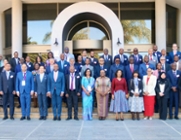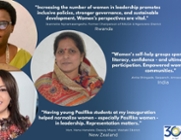Asia Pacific region: common climate action demands
01 November 2021
CLGF Pacific took part in a session on climate justice last month, as part of the C14 meetings, leading up to COP26. CLGF’s Regional Manager, Ms Karibaiti Taoaba was there to represent the Pacific island countries.
Organised by UN-Habitat and the Global Covenant of Mayors for Climate & Energy (GCoM), the Innovate4Cities 2021 climate change conference took place from 11 to 15 October 2021, online. This virtual global and regional event brought together cities, innovation, climate change, science, policy and practice, united by a common objective: enabling cities to take accelerated and more ambitious climate action. Around 7,000 participants from across the globe took part, including CLGF’s Secretary-General, Lucy Slack and Ms Taoaba took part in three different sessions.
The first of these sessions was with EAROPH, a partner to CLGF in some of our projects and also a member of the Pacific Partnership for New Urban Agenda (PP-NUA).
The second was with the Oceania Mayors Forum. As a member of the Oceania Global Covenant of Mayors Steering Committee, Ms Taoaba participated in the discussions during the session entitled: What is the latest IPCC report means for Local Government in the Pacific and also Small island States.
Lastly, with the University of Melbourne, Ms Taoaba reflected on the discussions around climate resilience at the Virtual Pacific Urban Forum and some thoughts from a regional perspective on climate change.
Climate Action demands
Climate justice balances justice for the planet, and justice for the most vulnerable communities, through equity and fair share applied to risks, consequences of action and resources. This is consistent with the United Nations Framework Convention on Climate Change.
What it means in practical terms if that those who have historically contributed most to climate change and benefitted economically as a result, take the most ambitious actions to significantly reduce their emissions, while supporting the most vulnerable communities. This support should be in the form of strengthening climate resilience by way of financial support for adaptation, compensating loss and damage, technology transfer and capacity building.
Ms Taoaba began her presentation by explaining that CLGF Pacific was based in Fiji and represented 10 member countries from across the region. Strategic planning had never been more urgent, because climate change is real, it is affecting everyone, and decisive action is needed to reverse it. She described how the levels of rainfall are becoming more unreliable, making drinking water more difficult to find; it is saltier with water tanks laying empty. Cyclones, storms and tsunamis are getting stronger, food crops are being destroyed. Storm surges are resulting in retreating shorelines, marine warming, rising sea levels with tropical cyclones one of the more serious threats.
Despite the introduction of more low cost, low carbon, Fiji is still highly vulnerable to climate related disasters and long-term planning is urgently needed.
Local government and communities central to climate action
There is evidence that some small island states will become completely submerged and the changes and disruption that are being witnessed across the Pacific require innovation going forward: new plans, a new approach to constructing buildings and infrastructure, and a new way of managing our countries. Local government and local communities are central to the impacts of climate change and must be at the forefront of decisions to mitigate and ensure climate justice is achieved.
The Pacific region has been trying to draw the world’s attention to the situation in this part of the globe and the fact that more needs to be done. There is, however, no single prescription, no quick-fix solution, and no one-size-fits-all. But urgent assistance to invest in the future is needed.
Ms Taoaba contends that there are many questions that need to be asked in the Pacific: what will happen if some of the small island states disappear? Where will the people go, if the lands are not there? Who will accommodate any relocation? How will people fare in foreign countries; will they adapt quickly; will they be happy or will they face discrimination? What will happen to the oceans that the small countries own – will they be taken away when the land disappears? And for those who wish to remain, who will pay for the new infrastructure?
Consultation with people in Kiribati has found that many wish to remain, living on floating ciites, growing their own food.
She concluded by saying that it is vitally important to ensure that people everywhere understand the far reaching realities of climate change and who will accept accountability. These are the issues that need to be addressed by Cop26.
Realities of climate change on daily life
The event provided many interesting perspectives from the Pacific and a full recording of the event is available with contributions from an impressive line-up of international, cross-generational and cross-sectoral speakers from across Asia and the Pacific.
The common demands for justice made from regional participants were:
- Recognise climate victims and document stories from their communities: It is important to monitor and document change, drawing on the lived experience of local communities. This can give reassurance to people that they are not alone in facing the impacts of climate change, and it can build the case for legal and financial redress.
- Hold polluting corporation and their governments to account through international law: Good monitoring and documentation can provide leverage for legal or voluntary restitution, assisting vulnerable communities to mitigate the impacts of climate change as well as making their own constructive transitions to a low emissions economy.
- Provide a carbon trading platform that incentivizes community based solutions: While carbon offsets should not be seen as the total solution for polluters, they offer opportunities for community based solutions, particularly for coastal, island and rural communities. An accessible user-friendly global platform with realistic pricing is urgently needed.
- Develop long term strategies for relocation of communities at risk of climate obliteration: While every attempt should be made to assist communities in retaining their lands, there should be long term contingency planning in the event of displacement, funded by polluting countries. In-country resettlement as well as climate refugee solutions may be needed, and these should be put in place well ahead of time.
More information on the Eastern Regional Organisation for Planning and Human Settlements is available on their international secretariat website.
Back to News





